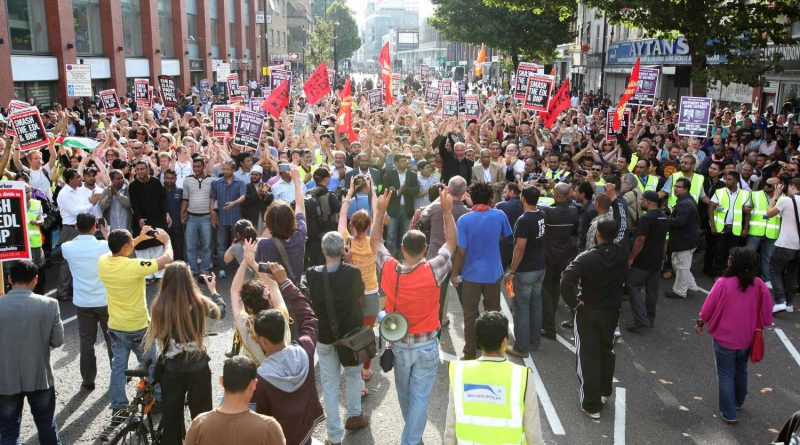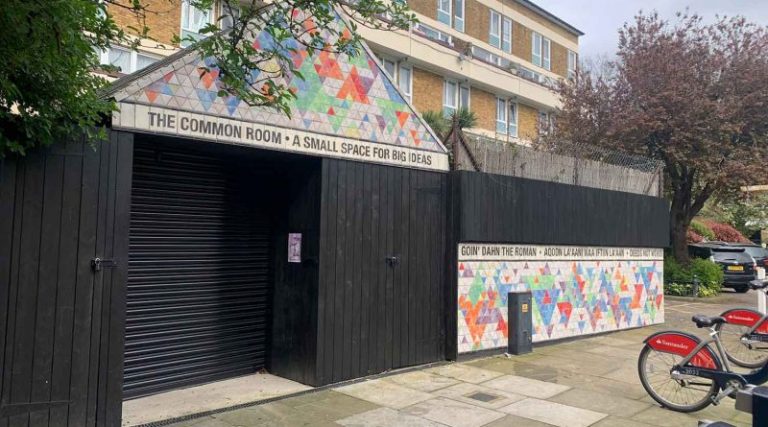How recent amendments to the Public Order Bill will erode local democracy
Campaigners in Tower Hamlets say plans to give police greater powers against protestors could deter local people from participating in peaceful demonstrations.
In recent years Tower Hamlets has seen many examples of peaceful protests from renters campaigning against rent increases, Antill Road residents protesting against the reversal of Liveable Streets and Extinction Rebellion holding a non-violent East London Uprising.
However, under changes to the Public Order Bill proposed by the Government on Monday, protests could be shut down preemptively before they cause serious disruption and campaigners could be stopped and searched based on the assumption that they intend to cause disruption without any actual disruptive act having occurred.
The amendment, which the House of Lords is currently considering, would broaden the current legal definition of ‘serious disruption’, giving police the power to place restrictions on individuals and grant them greater stop and search powers.
Imagine you’re attending a peaceful demonstration outside an estate agent on Roman Road to protest against rising rents and raise awareness of the Tower Hamlets London Renters Union. Previously, you might not have thought twice about donning a T-shirt saying: ‘Honk if your rent is too high,’ and taking to the streets with a megaphone. But under the proposed amendments, the police would be allowed to stop and search people based on the assumption of intent alone, potentially increasing the risk of individuals being profiled.
‘Democracy is more than a tick in a ballot box once every four years, it’s about participation and protest and this bill seriously threatens that.’
Luke Whiting
Forces would no longer have to consider protests by the same group as standalone incidents, but could instead consider their ‘total impact’ which would be enough to warrant intervention.
Luke Whiting, Bow resident and member of Extinction Rebellion Tower Hamlets, said: ‘The amendment is yet another sinister development in the Government’s attempt to suppress dissent. It’s part of a wider context where instead of engaging and negotiating with protestors, they automatically just clamp down on them.
‘Democracy is more than a tick in a ballot box once every four years, it’s about participation and protest and this bill seriously threatens that.’
The proposed legislation builds on the increased powers granted to the police in last year’s Police, Crime, Sentencing and Courts Act which placed firmer restrictions on protests. It also comes amid discussion of anti-strike laws that would impose minimum service levels on workers across the UK.
Whiting said: ‘It’s particularly concerning because we’re moving into a territory where the police will take action when they don’t even know what protestors’ intentions are, so no demonstration is safe even if you’re not planning on causing any disruption.’
Downing Street said that the changes seek to give the police greater ‘flexibility’ and ‘clarity’ about when they can intervene, but local unions and campaigners are concerned about the extension of rights that would allow the police to shut down protests pre-emptively.
Sian Smith from Tower Hamlets London Renters Union (LRU) said that the changes would significantly hinder the organisation’s ability to help vulnerable renters through methods of direct action.
‘A lot of the work we do at LRU is through direct action such as eviction resistance when people are being forced out of their flats, or protesting outside estate agents when deposits are being illegally taken away, so a Bill like this takes away a huge part of our leveraging power,’ said Smith.
A spokesperson from The Met Police Tower Hamlets said: ‘It is for Parliament to decide the law. We have not sought any new powers to curtail or constrain protest, but have asked for legal clarity about where the balance of rights should be struck.
‘During protests there is naturally a higher number of people on the streets, and so there is also an increased number of officers deployed to these footprints to manage the protests and ensure disruption is kept to a minimum … Because of these factors, we would expect to see an increase in policing tactics being used – including stop and search.’
According to Whiting: ‘The amendments won’t deter me from protesting and I hope this clampdown spurs people on and generates a reaction, but there is a risk that people who are more at risk of being profiled or who already feel targetted by the state will be deterred from taking part in demonstrations.’
The Bill is currently being scrutinized by the House of Lords, and any changes could be blocked by peers before they become law.
A spokesperson for the Mayor of Tower Hamlets said: ‘Protest holds a fundamental place in Tower Hamlets’ history – from the Battle of Cable Street in the 1930s to the demonstrations that faced down the English Defense League in the 2010s. While we understand the difficulties inherent in policing public demonstrations, the right to protest freely and peacefully is vital for the health and success of our democracy.’
As well as getting out onto the streets and engaging with your local community, Whiting said that people could also lobby peers in the House of Lords to block the amendments, who have been critical of previous attempts to increase police powers to shut down protests.
Feature image shows anti-English Defence League (EDL) and anti-British National Party (BNP) protest crowds by photographer Rehan Jamil @rehanwjamil.
If you enjoyed this article, read our piece about how Chisenhale’s Play Space became the symbol for saving school streets.








